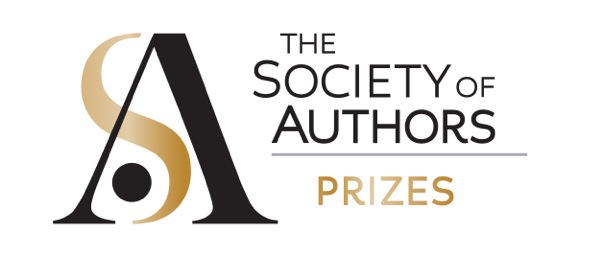The 2018 Saif Ghobash Banipal Prize for Arabic Literary Translation
Winner Shortlist Entries
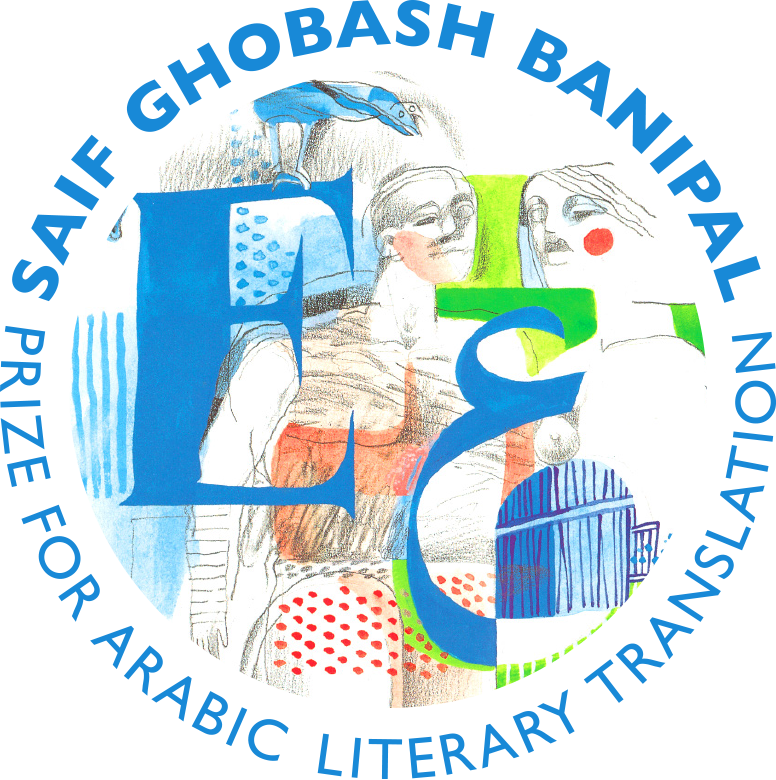
LUKE LEAFGREN wins the 2018 Prize
Watch the video of the Evening at Waterstone's Piccadilly with the 2018 winner and his author Muhsin al-Ramli, that took place the day after the Award Ceremony
"A seamless rendering of an outstanding work of fiction"


The 2018 Saif Ghobash Banipal Prize for Arabic Literary Translation is awarded to Luke Leafgren for his translation of the novel The President's Gardens by Iraqi author Muhsin al-Ramli, published by MacLehose Press. The judges chose his translation from the shortlist of four works announced on 10 December 2018. The award of £3,000 will be presented to Luke Leafgren on 13 February 2019 at the Translation Prizes Award Ceremony, organised and hosted by the Society of Authors, at the British Library's Knowledge Centre, along with the other translation prizes being awarded this year.
The judging panel comprised publisher and translator Pete Ayrton (chair), editor and translator Georgia de Chamberet, Jordanian author Fadia Faqir, and university lecturer and translator Sophia Vasalou. The prize is administered by Paula Johnson, Head of Prizes and Awards at the Society of Authors.
THE JUDGES' REPORT
THE WINNER
Luke Leafgren for his translation of the novel The President's Gardens by Muhsin al-Ramli
In this brilliant novel the personal, political and fantastical are interwoven to excavate and record Iraq's recent history in all its complexity, horror and absurdity. The translation by Luke Leafgren is imperceptible and mirrors the writer's many changes of register. The author is fortunate to have found a translator totally in sympathy with his writing. Faced with many difficult choices, Leafgren has produced a work both faithful to the Arabic and a work of art in English.
In a clear reference to Gabriel Garcia Márquez's Macondo, which was destroyed by the establishment of a banana plantation, Muhsin Al-Ramli's begins his novel with the discovery of nine banana crates, each containing a severed, mutilated head in an Iraqi village without bananas – one of the heads belonged to Ibrahim, "the fated", who is made sterile by poison gas in the Iran war, loses his foot during the invasion of Kuwait and, then, finds a job in the President's Gardens.
When Ibrahim is appointed to "care for these roses", he is impressed with how immaculate the garden appears on the surface - the crimes lie beneath. His job description and responsibilities keep shifting as he descends into the inferno until he becomes a grave-digger.
Despite Ibrahim's fear and fatalism, he begins to give the dead a dignified burial, register the date and time of their killing, establish and document their identity by painstakingly gathering shreds of evidence like skin, teeth, nails, etc.
Ibrahim's acts of salvation give a history to the thousands of Iraqi disappeared. The point is made that ordinary people can make a difference – giving an identity to nameless corpses ensures that they cannot be forgotten.
Tender, funny, tragic, wise and poetic, The President's Garden is imbued with the richness and complexity of a region that has known little peace over the last century. Luke Leafgren's translation conveys beautifully the spirit and idiosyncrasies of the original. It is a seamless rendering of an outstanding work of fiction. Both author and translator are to be warmly congratulated.
* * *
Winner Luke Leafgren says:
"Learning that my translation was selected for the shortlist was already the recognition that pleased me more than any other in my life, and I've been enjoying a complicated feeling of being grateful, humbled, proud, and inspired ever since. I am so grateful to Muhsin for writing this novel and then entrusting me with its translation. I think of Khaled Al-Masri, my good friend and Arabic teacher who helped me get my start in translating. I also feel my debt of gratitude to Yousif Hanna, an Iraqi friend who read parts of The President's Gardens with me to answer all my linguistic and cultural questions, and who could become a preeminent literary scholar if he weren't committed to a career in medicine. Finally, to Paul Engles and Christopher MacLehose, for believing in this book and publishing the translation."
Publisher Christopher MacLehose says:
"This is wonderful news. It gives a publisher immense pride that the scholarship and the genius of our translator should be recognised by the jury for your award."
ABOUT THE WINNING TRANSLATOR
Luke Leafgren is an Assistant Dean of Harvard College and teaches Arabic at Harvard University, where he received his PhD in Comparative Literature in 2012. He is also a keen sailor, and the inventor of the StandStand portable standing desk.
As well as translating the winning novel The President's Gardens, his first venture into literary translation was Mushin al-Ramli's second novel Dates on my Fingers (2014). He has also translated the debut novel of Shahad Al Rawi The Baghdad Clock (2018), whose Arabic original was shortlisted for the 2018 International Prize for Arabic Fiction, and Oh Salaam! (2014) by Najwa Barakat.
On the MacLehose Press website he describes how he came to translate The President's Gardens.
"Muhsin Al-Ramli was the first author I ever translated. While writing my dissertation and needing a creative outlet, I approached one of my Arabic teachers during the final years of graduate school to ask about how to get a start in literary translation. My teacher told me about a friend of his who was looking for a translator for his second novel. That friend was Muhsin, who passed through my teacher's hometown of Irbid, Jordan, on his way from Iraq to Spain in the early '90s. I read the novel – Dates on My Fingers – and as I was reading the Arabic text, I could hear in my head the voice of the narrator telling his story in English. I found myself relating to the narrator's attempt to make sense of his place in the world, and the English translation came through almost as quickly as I read." To continue, go to this link: https://www.maclehosepress.com/blog/2018/4/5/luke-leafgren-on-translating-the-presidents-gardens
ABOUT THE AUTHOR
 Muhsin al-Ramli was born in the village of Sudara, northern Iraq, in 1967. Since 1995 he has lived in Madrid, Spain, where he has published 11 works – collections of short stories, novels, a play, essays and poetry, in addition to translating some Spanish classics into Arabic, most notably Don Quixote, and co-founding Alwahaliterary magazine. He has a PhD in Philosophy and Spanish Literature from the Autonomous University of Madrid (2003), and teaches at the Saint Louis University, Madrid.
Muhsin al-Ramli was born in the village of Sudara, northern Iraq, in 1967. Since 1995 he has lived in Madrid, Spain, where he has published 11 works – collections of short stories, novels, a play, essays and poetry, in addition to translating some Spanish classics into Arabic, most notably Don Quixote, and co-founding Alwahaliterary magazine. He has a PhD in Philosophy and Spanish Literature from the Autonomous University of Madrid (2003), and teaches at the Saint Louis University, Madrid.
His three novels to date are all translated into English: the first, Scattered Crumbs, translated by Yasmeen Hanoosh, won the Arkansas Manuscript Translation Award; the second, Dates on My Fingers, and third, The President's Gardens, were both translated by Luke Leafgren, with both their Arabic originals being longlisted for the International Prize for Arabic Fiction (IPAF, aka Arabic Booker Prize) in 2009 and 2013 respectively. His novel-in-progress, Qisma's Fate, a follow-up to The President's Gardens, and also being translated by Luke Leafgren, is due out later this year.
Muhsin Al-Ramli writes on the MacLehose Press website about how he came to start writing the book in 2006. "I began writing The President's Gardens in 2006 after receiving the news of the murder of nine of my relatives, who were fasting on the third day of Ramadan. The people of the village found only their heads in banana crates, along with their identity cards. I dedicated the novel to their souls. It was a huge shock to me. It horrified me, and, to start with, the novel was a reaction to this event undertaken without planning or a clear vision."
To continue, go to this link: https://www.maclehosepress.com/blog/2018/4/5/muhsin-al-ramli-why-i-wrote-the-presidents-gardens
ABOUT THE WINNING TRANSLATION
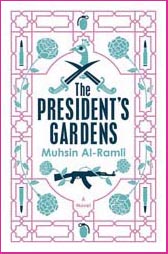
The President's Gardens
MacLehose Press (20 April 2017), Paperback edition: 352 pages. ISBN 9780857056788
The translated novel The President's Gardens has already been much reviewed and talked about since publication in 2017. Its Arabic original sold well and was longlisted for the International Prize for Arabic Fiction in 2013. It also has a Spanish edition Los Jardines Del Presidente.
Buy a copy in UK
https://www.amazon.co.uk/Presidents-Gardens-Muhsin-Al-Ramli/dp/0857056786
Buy a copy in US
https://www.amazon.com/Presidents-Gardens-MacLehose-Press-Editions-ebook/dp/B01GVOH04W
* * *
EVENTS:
• TRANSLATION PRIZES AWARD CEREMONY
7.00pm Wednesday 13 February
The Knowledge Centre, The British Library, 96 Euston Rd, London NW1 2DB
Hosted and organised by the Society of Authors, who administer all the prizes, the ceremony will award prizes for translation from Arabic, French, Italian German and Spanish and the Translators' Association First Translation Prize. https://www.societyofauthors.org/Prizes/Translation-Prizes
• AN EVENING WITH LUKE LEAFGREN AND MUHSIN AL-RAMLI
Discussions, Readings and Q&A ............... and refreshments
6.30pm Thursday 14 February, Lower Ground Reception, Waterstones Piccadilly, London W1V 9LW
Hosted by Banipal Trust for Arab Literature. http://www.banipaltrust.org.uk/prize/award2018.cfm
This is a free event, but places must be booked to avoid disappointment. Please register here on the Waterstones Piccadilly Events special webpage.
* * *
The 2018 Prize – The Shortlist
12 December 2018: The Saif Ghobash Banipal Prize is delighted to announce the shortlist of the 2018 Prize. The four works are translated by two former winners of the prize, Khaled Mattawa and Jonathan Wright, and two relative newcomers to literary translation Ben Koerber and Luke Leafgren.
The judges were impressed by the tremendous variety of the entries from different parts of the Arab world, ranging through poetry, crime, literary fiction and graphic novels. The shortlist reflects this diversity, with two novels about the wars in Iraq and their aftermath, a collection of poetry about Jerusalem, and a contemporary take on Cairo today. In the face of social and political upheaval, literature continues to make waves in the Arab world.
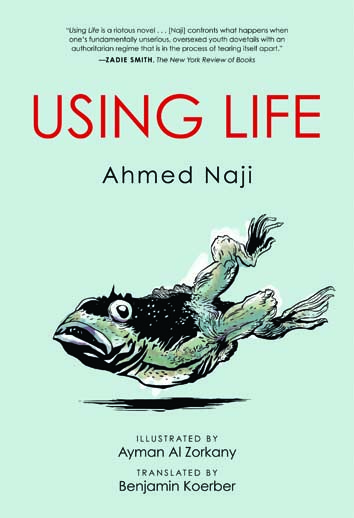



Using Life by Ahmed Naji (Egypt), translated by Ben Koerber (CMES Publications, University of Texas at Austin)
The President's Gardens by Muhsin Al-Ramli (Iraq), translated by Luke Leafgren (MacLehose Press)
Concerto al-Quds by Adonis (Syria), translated by Khaled Mattawa (Yale University Press)
Frankenstein in Baghdad by Ahmed Saadawi (Iraq), translated by Jonathan Wright (Oneworld)
The Judging Panel comprises publisher and translator Pete Ayrton (chair), editor and translator Georgia de Chamberet, Jordanian author Fadia Faqir and university lecturer and translator Sophia Vasalou.
To download a PDF of the announcement click here
THE JUDGES' COMMENTS
 Ben Koerber, shortlisted for his translation of Using Life by Ahmed Naji (Egypt),
Ben Koerber, shortlisted for his translation of Using Life by Ahmed Naji (Egypt),
• Published by CMES Publications, University of Texas at Austin,
14 November 2017. ISBN 978-1477314807, paperback, 230 pages, £15.99 / $16.92
Out of the fantastical time of a post-cataclysmic future, this novel unfolds a dystopian vision of Cairo seen through the eyes of a disaffected young filmmaker as he enters the circles of an age-old secret society with a mission to re-engineer Cairo from the ground up. A novel that stands out for its experimental style, originality, and freshness of voice, it presents the translator with unique challenges. This translation by Benjamin Koerber navigated these challenges with impressive skill, distinguishing itself by its bold and creative decisions, which enabled it to capture the briskness and zest of the original and recreate it with bracing fluency for the English reader.
• Ahmed Naji is an Egyptian journalist and novelist. He currently lives in the USA, where he moved following his release from a Cairo jail after serving six months of a two-year sentence for "indecency and disturbing public morals". His trial had followed the publication of an an excerpt from Using Life (Istikhdamu al-Hayat, 2014) by Cairo literary weekly Akhbar al-Adab.
• Ben Koerber is an assistant professor of Arabic in the Department of African, Middle Eastern, and South Asian Languages and Literatures at Rutgers University. He has a PhD in Middle Eastern Languages and Literatures (Arabic) from the University of Texas at Austin. His current research is concerned with Arabic language, literature, and culture from all periods, with a focus on new literary genres in Egypt and Tunisia. His latest work is Conspiracy in Modern Egyptian Literature (Edinburgh UP, 2017).
* * *
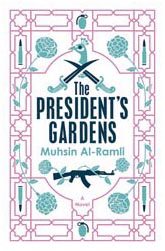 Luke Leafgren, shortlisted for his translation of The President's Gardens by Muhsin Al-Ramli
Luke Leafgren, shortlisted for his translation of The President's Gardens by Muhsin Al-Ramli
• Published by MacLehose Press, 20 April 2017,
ISBN: 978-0857056788, paperback, 352 pages, £12.99 / $16.99
The dedication "To the souls of my nine relatives slaughtered on the third day of Ramadan, 2006 . . ." sets the tone of this powerful, evocative novel. Taking place in the period that covers the two Iraq wars, the book has at its centre the friendship of three men from the same village – the lives dependent on the fickle choices of the country's despotic rulers. The subject matter is sombre but lyrical descriptions and dark humour make the book a gripping and inspiring read. You do not notice Luke Leafgren's translation – a sure sign of how good it is.
• Muhsin al-Ramli was born in 1967 in northern Iraq. Since 1995 he has lived in Madrid, Spain, where he has published 11 works - collections of short stories, novels, a play, essays and poetry) in addition to translating some Spanish classics into Arabic, most notably Don Quixote. He has a PhD in Philosophy and Spanish Literature from the Autonomous University of Madrid (2003), and teaches at the Saint Louis University, Madrid.
• Luke Leafgren is an Assistant Dean of Harvard College and teaches Arabic at Harvard University, where he received his PhD in Comparative Literature in 2012. He has also translated Mushin al-Ramli's novel Dates on my Fingers (2014), the debut novel of Shahad Al Rawi The Baghdad Clock (2018), and Oh Salaam! (2014) by Najwa Barakat, and is the inventor of the StandStand portable standing desk.
* * *
 Khaled Mattawa, shortlisted for his translation of Concerto al-Quds by Adonis
Khaled Mattawa, shortlisted for his translation of Concerto al-Quds by Adonis
• Published by Yale University Press, 28 November 2017, ISBN: 978-0300197648, hardcover, 96 pages, £18.99 / $25.00
Adonis's poem about Jerusalem, written in free verse, explores the tension between the static and the dynamic, religion and secularism, modernity. The Concerto, drawing on historical and philosophical sources, is an intertextual work, which echoes or alludes to classical literature, the Bible, the Qur'an, etc. and is punctuated by a central narrative written in modern journalese, with the aim of liberating the secular, multi-civilizational city of Jerusalem from the tyranny of religious narratives and contestation. Very few translators are brave enough to tackle Adonis' multifarious poems, but Khaled Mattawa has risen to the challenge and produced an English translation that captures the beauty, multiplicity and resonances of the original.
Khaled Mattawa is a poet and a translator of poetry. Born in Benghazi, Libya, in 1964, he emigrated to the USA in 1979. Alongside his own poetry collections, written in English, he has translated poetry by Adonis (winning the 2011 Saif Ghobash Banipal Prize for his Adonis: Selected Poems), Saadi Youssef, Iman Mersal, Amjad Nasser, Fadhil al-Azzawi, Joumana Haddad and Mariam al-Masri. In September 2014 he was awarded a prestigious MacArthur Fellowship, one of 21 "genius grants" awarded to outstanding figures by the MacArthur Foundation.
Adonis is internationally renowned as a poet, essayist, philosopher and theoretician of Arab poetics and has been referred to in interviews as "the greatest living poet of the Arab world" and "the grand old man of poetry, secularism and free speech in the Arab world". He has been writing poetry for 75 years and has more than fifty published works in Arabic of poetry, criticism, essays, and translations. His modernist influence on Arabic poetry is often compared to that of T S Eliot on Anglophone poetry. Born Ali Ahmad Said Esber in Qassabin village, Syria, in 1930, he adopted the name Adonis when he was 17. On 9 November this year he gave the Saif Ghobash Banipal Prize Lecture.
* * *
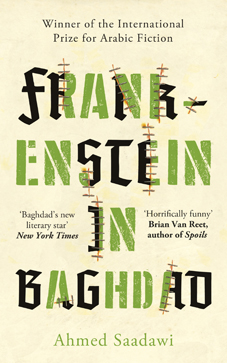 Jonathan Wright, shortlisted for his translation of Frankenstein in Baghdad by Ahmed Saadawi
Jonathan Wright, shortlisted for his translation of Frankenstein in Baghdad by Ahmed Saadawi
• Published by Oneworld Publications, UK, 1 February 2018, ISBN: 978-1786070609, paperback, 288 pages, £12.99.
• The US edition is published by Penguin Books USA, 23 January 2018, ISBN: 978-0143128793, paperback, 288 pages, $16.00
Jonathan Wright's fluid translation of this weird and wonderful magical-realist novel inspired by Mary Shelley's monster is superb. After the US invasion and occupation of Iraq, Baghdad becomes a lawless place where sectarian violence, administrative bungling and political corruption run rife. Armed gangs roam the streets. Suicide bombings are the norm. The narrative centres around the residents of Bataween and what unfolds when Ahmed Saadawi's enraged Frankenstein – created by a notorious junk dealer – embarks on a killing spree to eliminate those who have turned the city into a slaughterhouse. Frankenstein in Baghdad is a surreal satire; an absurdist horror show.
Ahmed Saadawi is a novelist, journalist and documentary filmmaker, born in 1973 in Baghdad, where he still lives. In 2010 he was selected for the Beirut39 Hay Festival project as one of the thirty-nine best Arab authors under the age of forty. His third novel, Frankenstein in Baghdad (2013), won the 2014 International Prize for Arabic Fiction. Its French edition won Le Grand Prix de l'Imaginaire in 2017, while the English edition was shortlisted for the 2018 Man Booker International Prize. The Arabic original was listed No 15 in Banipal 63's focus feature "The 100 Best Arabic Novels".
Jonathan Wright is an award-winning translator of contemporary Arabic fiction. He has won the prize twice before, in 2013 for Youssef Zeidan's Azazeel and in 2016 for Saud Alsanousi's The Bamboo Stalk, both of whose Arabic originals were winners of the International Prize for Arabic Fiction. His translation of The Iraqi Christ, short stories by Hassan Blasim, won the 2014 Independent Foreign Fiction Prize.
* * *
The entries for the 2018 Prize
In the thirteenth year of the prize there are 20 entries, comprising three collections of poetry and seventeen novels including one graphic novel. The entries are listed by title in alphabetical order of translator, or first translator listed when more than one. There are 21 translators, ten of whom are women. Both poetry works are translated by two or more translators, and two translators, Elisabeth Jaquette and Nancy Roberts, have two entries each. To download a PDF of the entries and judging panel for 2018 click here.


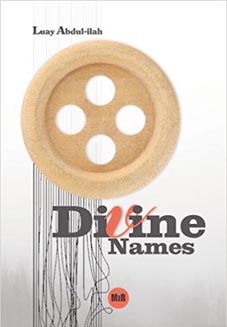
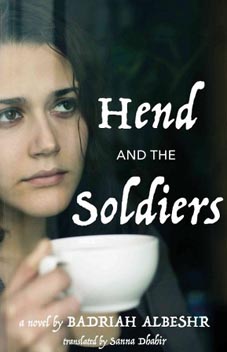
In Jerusalem and Other Poems by Tamim al-Barghouti, translated by Radwa Ashour, Tamim al-Barghouti, Ahdaf Soueif (Interlink Books)
No Road to Paradise by Hassan Daoud, translated by Marilyn Booth (Hoopoe Fiction, AUC Press)
Divine Names by Luay Abdul-Ilah, translated by Judy Cumberbatch (Mira Publishing)
Hend and the Soldiers by Badriah Albeshr, translated by Sanna Dhahir (CMES Publications, Univ Texas at Austin)



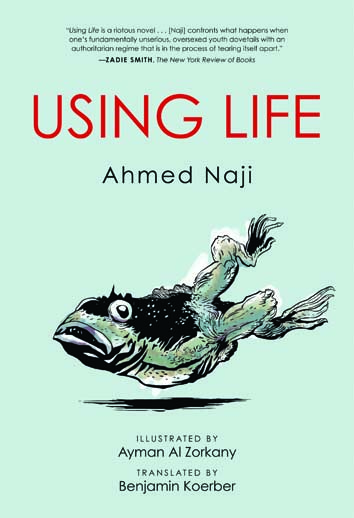
The American Quarter by Jabbour Douaihy, translated by Paula Haydar (Interlink Books)
The Apartment in Bab el-Louk by Donia Maher (with illustrations by Ganzeer and Ahmad Nady), translated by Elisabeth Jaquette (Darf Publishers)
Suslov's Daughter by Habib Abdulrab Sarori, translated by Elisabeth Jaquette (Darf Publishers)
Using Life by Ahmed Naji, translated by Ben Koerber (CMES Publications, University of Texas at Austin)



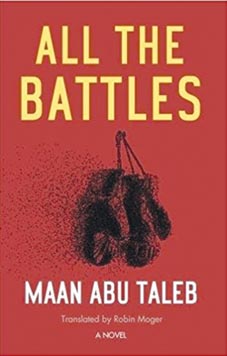
The President's Gardens by Muhsin Al-Ramli, translated by Luke Leafgren (MacLehose Press)
Concerto al-Quds by Adonis, translated by Khaled Mattawa (Yale University Press)
Tales of Yusuf Tadrus by Adel Esmat, translated by Mandy McClure (AUC Press)
All The Battles by Maan Abu Taleb, translated by Robin Moger (Hoopoe Fiction, AUC Press)
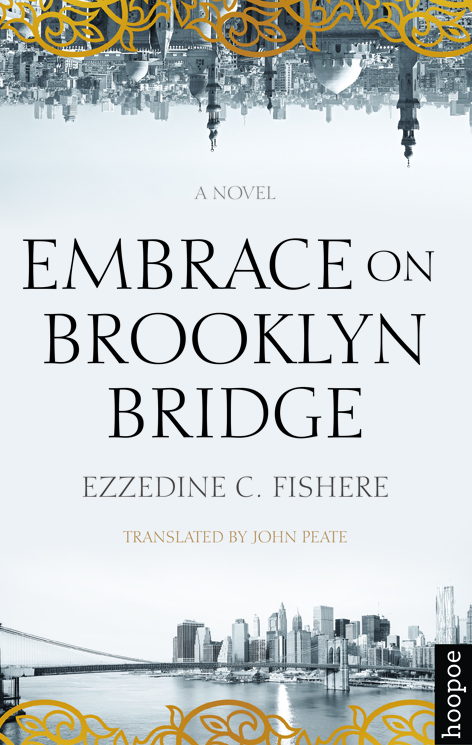
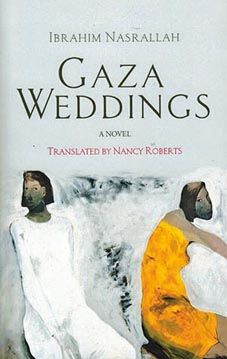


Embrace on Brooklyn Bridge by Ezzedine C. Fishere, translated by John Peate (AUC Press)
Gaza Weddings by Ibrahim Nasrallah, translated by Nancy Roberts (Hoopoe Fiction, AUC Press)
Farewell, Damascus by Ghada Samman, translated by Nancy Roberts (Darf Publishers)
Bled Dry by by Abdelilah Hamdouchi, translated by Benjamin Smith (Hoopoe Fiction, AUC Press)

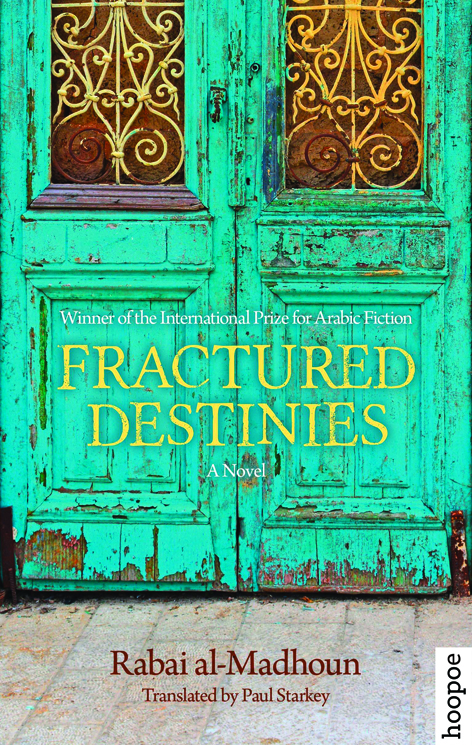


The Blueness of the Evening: Selected Poems of Hassan Najmi by Hassan Najmi, translated by Mbarek Sryfi and Eric Sellin (University of Arkansas Press)
Fractured Destinies by Rabai Al-Madhoun, translated by Paul Starkey (Hoopoe Fiction, AUC Press)
The Baghdad Eucharist by Sinan Antoon, translated by Maia Tabet (Hoopoe Fiction, AUC Press)
Frankenstein in Baghdad by Ahmed Saadawi, translated by Jonathan Wright (Oneworld)
NOTES:
The entries are for fiction and poetry translated into English and published between 1 April 2017 and 31 March 2018 from original Arabic works. There is no limit on the number of entries from a publisher. Publishers can be based anywhere in the world, so long as the works can be purchased in the UK, either by a distributor or online.
Each year there is a new judging panel of four – two who read both Arabic and English, and two only the English. For all details of the 2018 panel click here
The 2018 Short List will be announced in December 2018. The Winner of the 2018 Prize will be announced late January 2019
The Award Ceremony will be held in late February or early March 2019
The prize is administered on behalf of the Banipal Trust by the UK's Society of Authors
The translation prizes administered by the Society of Authors
ANY QUESTIONS
If you have any questions about the prize, the judges, the administration, etc., first of all, do check out the general information about the prize here. If this does not answer your query, either email the Banipal Trust on info@banipaltrust.org.uk or contact the Society of Authors here

